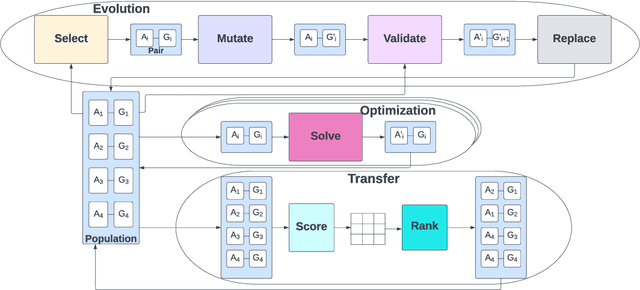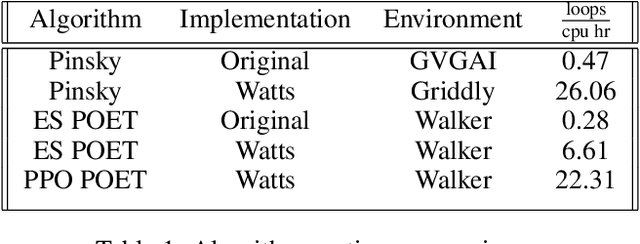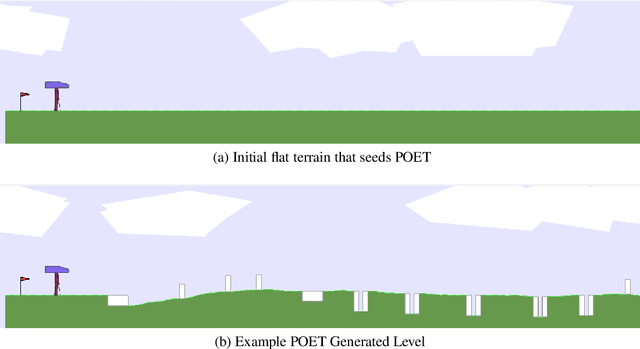Aaron Dharna
Foundation Model Self-Play: Open-Ended Strategy Innovation via Foundation Models
Jul 09, 2025Abstract:Multi-agent interactions have long fueled innovation, from natural predator-prey dynamics to the space race. Self-play (SP) algorithms try to harness these dynamics by pitting agents against ever-improving opponents, thereby creating an implicit curriculum toward learning high-quality solutions. However, SP often fails to produce diverse solutions and can get stuck in locally optimal behaviors. We introduce Foundation-Model Self-Play (FMSP), a new direction that leverages the code-generation capabilities and vast knowledge of foundation models (FMs) to overcome these challenges by leaping across local optima in policy space. We propose a family of approaches: (1) \textbf{Vanilla Foundation-Model Self-Play (vFMSP)} continually refines agent policies via competitive self-play; (2) \textbf{Novelty-Search Self-Play (NSSP)} builds a diverse population of strategies, ignoring performance; and (3) the most promising variant, \textbf{Quality-Diveristy Self-Play (QDSP)}, creates a diverse set of high-quality policies by combining the diversity of NSSP and refinement of vFMSP. We evaluate FMSPs in Car Tag, a continuous-control pursuer-evader setting, and in Gandalf, a simple AI safety simulation in which an attacker tries to jailbreak an LLM's defenses. In Car Tag, FMSPs explore a wide variety of reinforcement learning, tree search, and heuristic-based methods, to name just a few. In terms of discovered policy quality, \ouralgo and vFMSP surpass strong human-designed strategies. In Gandalf, FMSPs can successfully automatically red-team an LLM, breaking through and jailbreaking six different, progressively stronger levels of defense. Furthermore, FMSPs can automatically proceed to patch the discovered vulnerabilities. Overall, FMSPs represent a promising new research frontier of improving self-play with foundation models, opening fresh paths toward more creative and open-ended strategy discovery
Watts: Infrastructure for Open-Ended Learning
Apr 28, 2022



Abstract:This paper proposes a framework called Watts for implementing, comparing, and recombining open-ended learning (OEL) algorithms. Motivated by modularity and algorithmic flexibility, Watts atomizes the components of OEL systems to promote the study of and direct comparisons between approaches. Examining implementations of three OEL algorithms, the paper introduces the modules of the framework. The hope is for Watts to enable benchmarking and to explore new types of OEL algorithms. The repo is available at \url{https://github.com/aadharna/watts}
Transfer Dynamics in Emergent Evolutionary Curricula
Mar 03, 2022



Abstract:PINSKY is a system for open-ended learning through neuroevolution in game-based domains. It builds on the Paired Open-Ended Trailblazer (POET) system, which originally explored learning and environment generation for bipedal walkers, and adapts it to games in the General Video Game AI (GVGAI) system. Previous work showed that by co-evolving levels and neural network policies, levels could be found for which successful policies could not be created via optimization alone. Studied in the realm of Artificial Life as a potentially open-ended alternative to gradient-based fitness, minimal criteria (MC)-based selection helps foster diversity in evolutionary populations. The main question addressed by this paper is how the open-ended learning actually works, focusing in particular on the role of transfer of policies from one evolutionary branch ("species") to another. We analyze the dynamics of the system through creating phylogenetic trees, analyzing evolutionary trajectories of policies, and temporally breaking down transfers according to species type. Furthermore, we analyze the impact of the minimal criterion on generated level diversity and inter-species transfer. The most insightful finding is that inter-species transfer, while rare, is crucial to the system's success.
Co-generation of game levels and game-playing agents
Jul 16, 2020



Abstract:Open-endedness, primarily studied in the context of artificial life, is the ability of systems to generate potentially unbounded ontologies of increasing novelty and complexity. Engineering generative systems displaying at least some degree of this ability is a goal with clear applications to procedural content generation in games. The Paired Open-Ended Trailblazer (POET) algorithm, heretofore explored only in a biped walking domain, is a coevolutionary system that simultaneously generates environments and agents that can solve them. This paper introduces a POET-Inspired Neuroevolutionary System for KreativitY (PINSKY) in games, which co-generates levels for multiple video games and agents that play them. This system leverages the General Video Game Artificial Intelligence (GVGAI) framework to enable co-generation of levels and agents for the 2D Atari-style games Zelda and Solar Fox. Results demonstrate the ability of PINSKY to generate curricula of game levels, opening up a promising new avenue for research at the intersection of procedural content generation and artificial life. At the same time, results in these challenging game domains highlight the limitations of the current algorithm and opportunities for improvement.
 Add to Chrome
Add to Chrome Add to Firefox
Add to Firefox Add to Edge
Add to Edge